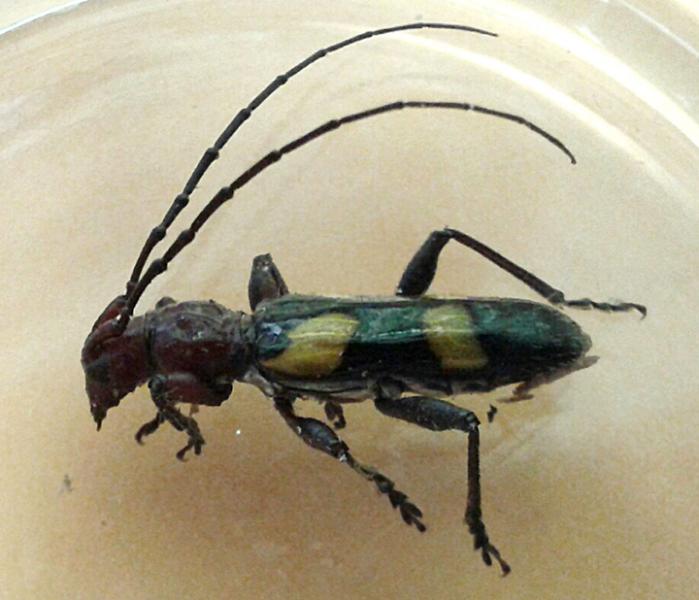CBP Also Intercepts a First Locally Reported Chinese Wax Scale from Spain
PHILADELPHIA – The U.S. Department of Agriculture (USDA) confirmed today that two recent insect species that U. S. Customs and Border Protection (CBP) agriculture specialists in Philadelphia intercepted in maritime shipments were the first recorded interceptions of those insects in the United States.
The USDA also confirmed that a third recent insect interception is a first reported discovery of that species for the Philadelphia area.

U.S. Customs and Border Protection agriculture specialists recorded the nation's first documented interception of Stenygra setigera (Cerambycidae), from the Longhorned Beetle family, in a container of granite from Brazil in Philadelphia on November 17, 2014.
CBP agriculture specialists intercepted Dalmochrimnus guatemalanus (Lygaeidae), a species of seed bug, in a shipment of cassava and chayotes from Costa Rica on November 7; and Stenygra setigera (Cerambycidae), from the Longhorned Beetle family, in a container of granite from Brazil on November 17. These seed bug and longhorned beetle interceptions are the first reported in the United States.
CBP agriculture specialists also intercepted Ceroplastes sinensis (Coccidae), or Chinese Wax Scale, in a shipment of persimmons on November 20. This is the first reported interception locally of Chinese Wax Scales.
“Keeping these insect pests out of the United States is of grave concern for U.S. Customs and Border Protection, and our agriculture specialists take their job very seriously,” said Susan Stranieri, CBP Port Director for the Area Port of Philadelphia. “Holding the line against destructive insects at our nation’s borders protects America’s varied agricultural industries, and saves our nation’s economy the expense associated with eradicating and recovering from new invasive species.”
During all three interceptions, CBP submitted the insect specimens to USDA entomologists for complete identification.
Dalmochrimnus guatemalanus are members of the Lygaeidae family or seed bugs, and are significant pests of crops, grains, shrubs and trees. They are not known to occur in the United States. The USDA prescribed that the shipment of Costa Rica cassava and chayotes be fumigated. They were destined to a Maryland importer.
Stenygra setigera are members of the Cerambycidae family of longhorned beetles native to Brazil, Paraguay, Argentina and Bolivia. They are serious wood-boring pests of forests. The importer is deciding between fumigating, re-exporting or destroying the shipment of Brazilian granite, which was destined to Delaware.
Ceroplastes sinensis are a pest of commercial citrus crops in Spain including oranges, lemons and tangerines. The insect has a waxy external layer that acts as a protective barrier against pesticide treatments, making pest control a difficult task. The importer fumigated the shipment of persimmons.
CBP agriculture specialists work closely with USDA’s, Animal and Plant Health Inspection Service (APHIS), Plant Protection and Quarantine (PPQ) to protect our nation’s agriculture resources against the introduction of foreign plants, plant pests, and animal diseases. Visit the USDA website for more information on the USDA APHIS PPQ program.
CBP agriculture specialists have extensive training and experience in the biological sciences and agricultural inspection. On a typical day, they inspect tens of thousands of international air passengers, and air and sea cargoes nationally being imported to the United States and seizes 4,380 prohibited animal products and plant materials, and intercepts 440 agriculture insect pests and diseases.
Visit CBP's Agriculture webpage to learn more about how CBP protects America's agriculture industries against destructive invasive insects and plants, and from plant and animal diseases.

